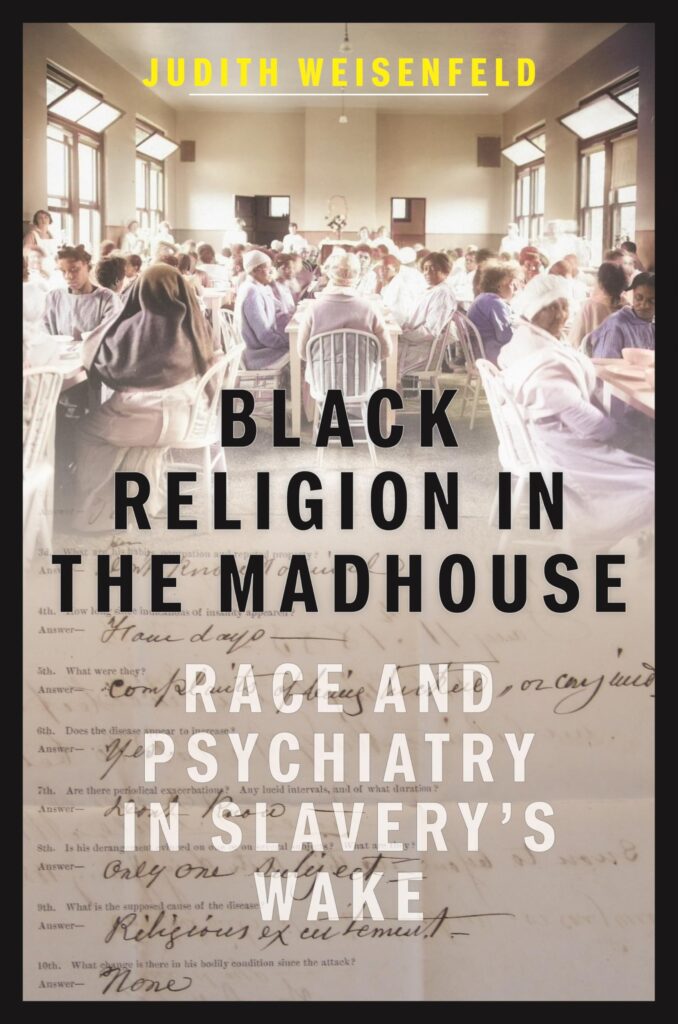Race and Psychiatry in Slavery’s Wake

Between the 18th and 19th centuries, a significant number of African Americans were institutionalized for a psychosis known as “religious excitement.” During this Jim Crow era, Black spirituality was often pathologized by white psychiatrists as a form of mental illness. Where a white Christian might have been praised as pious, a Black Christian would be considered delusional or deranged. Weisenfeld’s book, Black Religion in the Madhouse, explores the religious institutionalization of Black Americans and draws powerful connections to contemporary racism, particularly within mental health systems and police encounters.
Weisenfeld begins her book with a case study on Judy B., whose Black spiritual behaviors were disregarded as superstition and pathologized as “religious excitement.” Her experience reflects a larger issue in 19th-century southern psychiatry, where Black spirituality was viewed as fanatical, irrational, and dangerous. This racialized psychiatric framework, Weisenfeld argues, was used to suppress Black autonomy and characterize Black religious practitioners as mentally unfit for society.
However, the rise of Black psychiatrists and mental health activists challenged these oppressive frameworks. By reframing mental health away from racialized diagnoses, figures such as Rosa Kittrell became voices against a discipline dominated by white practitioners. Despite these efforts, the ramifications of past practices remain prevalent in contemporary culture. Today, Black individuals are disproportionately stereotyped as aggressive or unstable, which only further propels cases of police brutality.
What begins as a historical study of the spiritual institutionalization of Black Americans evolves into a powerful narrative of spiritual strength and resilience. Weisenfeld’s work not only chronicles religious medical racism but also tells the story of Black Americans’ spiritual endurance in the face of enormous challenges.
Judith Weisenfeld is an Agate Brown and George L. Collord Professor in the Department of Religion at Princeton University. In addition to her current work, she is the author of “New World A-Coming: Black Religion and Racial Identity during the Great Migration,” which explores racial entanglements of new religious movements in the early 20th-century urban north.
Judith Weisenfeld is Agate Brown and George L. Collord Professor in the Department of Religion at Princeton University and author, most recently, of New World A-Coming: Black Religion and Racial Identity during the Great Migration.
Reviews and Endorsements of this publication include:
“Breaks new ground by documenting how American psychiatry institutionalized a specific form of racism―one that pathologized black religious expressions. The book’s genius is showing how these diagnostic categories evolved over time and reached beyond asylums, shaping African American experiences after the Civil War. Weisenfeld skillfully recovers and uplifts individuals from the sparse historical records of African American psychiatric cases, honoring them in powerful vignettes. This book is a game changer for our historical understandings of religion, race, and mental health.” — Kristy L. Slominski, author of Teaching Moral Sex: A History of Religion and Sex Education in the United States
“Illuminates the often-overlooked intersection of religion, race, and psychology at the birth of U.S. psychiatry. Weisenfeld tells a compelling narrative of the historical pathologization of African American religiosity and how psychiatric ideas about rationality and irrationality came to shape dominant understandings of Black religions. . . . Both a monumental achievement of historical scholarship and deeply moving. . . . Invaluable for scholars U.S. religions but deserves to be read by practicing psychotherapists as well. . .I cannot recommend this book highly enough!” — Ira Helderman, author of Prescribing the Dharma: Psychotherapists, Buddhist Traditions, and Defining Religion
For more information on this publication, click here.
